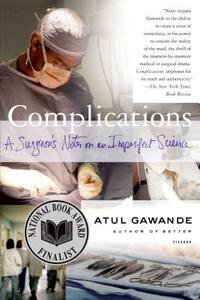Take a photo of a barcode or cover
I read this book to gain some insight into my husband's future profession.
It was entertaining and readable with a good mix of engaging stories and honest reflections into modern medicine.
It was entertaining and readable with a good mix of engaging stories and honest reflections into modern medicine.
I'm currently reading/reviewing this book for an educational stats class. I'm curious to see how it'll be incorporated in the class content.
This book takes away as much of the mystery surrounding modern medicine as it adds back to it. Dr. Gawande presents several stories and case studies from his years of surgical residency, and adds to them the insight that only an insider would have. He lets us know that doctors are far from infallible, and sometimes medical professionals just don't know what to do. But at the same time, a physician can develop a sort of sixth sense and some unconscious clue will push them towards the correct decision, thus saving a patient's life. An interesting, well-written book that is recommended for anyone with an interest in medicine.
emotional
informative
reflective
medium-paced
I wish for more patients, or future patients, to read this book and think about it. My own experience as a patient and patient-advocate has been that the patient must always ask questions, and if the questions aren't answered to the satisfaction of the patient, it's time to get a new doctor. Doctors don't know everything and aren't perfect, and that is OK.
Of course, I knew all this well before reading the book, but Gawande's literary skills are sufficient to make even my jaded old ass stay interested.
Of course, I knew all this well before reading the book, but Gawande's literary skills are sufficient to make even my jaded old ass stay interested.
excellent! we often look at our doctors as somehow infallible - as more than human. but that's not true - they make mistakes, just like the rest of us. partly because of circumstances, partly because they can't know everything, mostly because the human body is complex and each case is different. but the good doctors - and they are mostly good - try. the learn what they can, apply previous experience, listen to their patients. gawande walks us thru multiple cases - some that go well, and others that don't. he reminds us that medicine is an imperfect science, but that it's the best we've got. a must read for doctors and patients.
Very uneven. Some parts were truly compelling, and in others "um, exactly why are you writing about this?" I would bet he is a better surgeon than a writer.
I really enjoyed the author's straight-forward and honest approach to subjects like doctors making mistakes, who should make medical decisions for patients, autopsies, weight loss, when doctors are unfit to continue practicing and many others. I was fascinated by many of the stories and I think this is probably one of the most interesting books I've read.
Best for: People who enjoy good writing about medical issues. NOT for those who get squeamish reading about surgical procedures.
In a nutshell: Surgeon Atul Gawande (you probably know him from Being Mortal; I think my favorite of his is the Checklist Manifesto) shares stories about his time as a surgeon, exploring the reality that surgeons are humans and make mistakes.
Worth quoting:
“In the medicine, we have long faced a conflict between the imperative to give patients the best possible care and the need to provide novices with experience.”
Why I chose it: I can’t believe I haven’t read this yet - I thought I’d read all of his books. So when I sorted my Goodreads list for this CBR10 I was shocked to see it on there. I worried I’d start reading it and realize I’d read it before, but nope. It was new to me!
Review:
First off - CANNONBALL! My sixth since I started with CBR 5. Ah, how the time flies.
I enjoyed this book. I think it could have been better organized, but any time I get to read Dr. Gawande’s writing, I know I’m going to learn something and I’m going to enjoy reading it. He’s so talented, it seems unfair - a surgeon who can also write, and write well?
This book explores, through three distinct parts, the challenges of medicine that arise because humans are humans who need to learn and who make mistakes. The first section looks at learning and mistakes, the second at trying (and sometimes failing) to solve medical mysteries, and the third focuses on indecision.
The book starts off intensely, with Gawande sharing how he learned to put in a central line. It’s quite graphic, and does a great job of getting across the point that we all know somewhere in our mind (or every Thursday night when we watch Grey’s Anatomy): that doctors have to learn somehow. And usually that means performing on patients who are sick and injured. As patients, we want the best to treat us and our families, but the best only get there by practicing, which means that at some point we’re going to get the worst.
The second section, on medical mysterious, explores the frustration of healthcare professionals and patients when there is something wrong but we don’t know the cause and don’t know how to fix it. Like, for example, the woman who had nearly uncontrollable nausea for her ENTIRE PREGNANCY. Basically, what the Duchess of Cambridge had, but apparently it never stopped. I just … ack.
The final section is a reminder of the fact that sometimes, doctors just don’t know exactly what to do. The last chapter illustrates this amazingly well, with a woman who either has cellulitis or flesh-eating bacteria, and the doctors — and the patient — need to make a decision on the path forward. It looks at how much should doctors be directing care and how much should patients be? How do you find a compromise that respects the choice of the patient but also the knowledge and experience of the doctor?
Like I said, it’s an interesting book. It’s not a five-star read for me mostly because the chapters aren’t as well-connected as they could be. But it’s a strong four, because it’s Gawande.
In a nutshell: Surgeon Atul Gawande (you probably know him from Being Mortal; I think my favorite of his is the Checklist Manifesto) shares stories about his time as a surgeon, exploring the reality that surgeons are humans and make mistakes.
Worth quoting:
“In the medicine, we have long faced a conflict between the imperative to give patients the best possible care and the need to provide novices with experience.”
Why I chose it: I can’t believe I haven’t read this yet - I thought I’d read all of his books. So when I sorted my Goodreads list for this CBR10 I was shocked to see it on there. I worried I’d start reading it and realize I’d read it before, but nope. It was new to me!
Review:
First off - CANNONBALL! My sixth since I started with CBR 5. Ah, how the time flies.
I enjoyed this book. I think it could have been better organized, but any time I get to read Dr. Gawande’s writing, I know I’m going to learn something and I’m going to enjoy reading it. He’s so talented, it seems unfair - a surgeon who can also write, and write well?
This book explores, through three distinct parts, the challenges of medicine that arise because humans are humans who need to learn and who make mistakes. The first section looks at learning and mistakes, the second at trying (and sometimes failing) to solve medical mysteries, and the third focuses on indecision.
The book starts off intensely, with Gawande sharing how he learned to put in a central line. It’s quite graphic, and does a great job of getting across the point that we all know somewhere in our mind (or every Thursday night when we watch Grey’s Anatomy): that doctors have to learn somehow. And usually that means performing on patients who are sick and injured. As patients, we want the best to treat us and our families, but the best only get there by practicing, which means that at some point we’re going to get the worst.
The second section, on medical mysterious, explores the frustration of healthcare professionals and patients when there is something wrong but we don’t know the cause and don’t know how to fix it. Like, for example, the woman who had nearly uncontrollable nausea for her ENTIRE PREGNANCY. Basically, what the Duchess of Cambridge had, but apparently it never stopped. I just … ack.
The final section is a reminder of the fact that sometimes, doctors just don’t know exactly what to do. The last chapter illustrates this amazingly well, with a woman who either has cellulitis or flesh-eating bacteria, and the doctors — and the patient — need to make a decision on the path forward. It looks at how much should doctors be directing care and how much should patients be? How do you find a compromise that respects the choice of the patient but also the knowledge and experience of the doctor?
Like I said, it’s an interesting book. It’s not a five-star read for me mostly because the chapters aren’t as well-connected as they could be. But it’s a strong four, because it’s Gawande.






